Things are off to a splendid start here in Joburg, or Jozi, as it is affectionately called. I’ve settled into a groove. As I was walking home yesterday in the dark of early evening from my new manicurist in Braamfontein, making my way down an unfamiliar street, I took in the sights and sounds of the evening. Most stores were closed and shuttered, except for barbershops, beauty salons, and small convenience stores on each block that I have always called ‘the corner store.’ Small groups of men collected outside of each open establishment talking loudly with each other, and with friends in parked cars. Some played with their small children. I hurried on along the bricked sidewalk in between tall buildings (many of them are small colleges and training schools). As I walked, it fully hit that I am spending the summer in Johannesburg – an African city. A city that is brimming with fun things to do, like trendy restaurants that feature live music and that stay open late. There are weekend bike and brunch events, art gallery openings, outdoor arts markets, South African movies, and I am sure as time goes along, I will hear of the city’s dance party scene. There is also jazz. Jazz is everywhere – at restaurants, special events and in concert halls. There seems to be plenty of work and opportunity for the musicians. And when you have a vibrant active music scene, creativity abounds. During my first week, I attended four jazz shows. Also, just living in a place gives one perspective, and I have learned a few things. There are particular lessons to be learned from living in a majority Black industrialized city that was previously under legal apartheid, just like the United States. The comparisons I have been able to draw in this short time shed light on the racial inequity circumstance of African Americans in the US that for me, are now only visible from across the Atlantic. Please forgive me for venting along the way. It can’t be helped.
I had an active first week. Last Tuesday, my third day in the country, I met with my friend, jazz pianist Yonela Mnana, about my project here. As usual, he offered extremely valuable and essential insights to make things go forward. I am investigating the trans-Atlantic connections between the African American and South African jazz traditions. We had to wait for the loadshedding episode at my apartment to end before he came, and I now have a relationship with heat as a kind of currency that I have never had before. I’ve always only used space heaters to supplement flimsy heating systems. Now…well…let’s just say I have a close relationship with each of them. But anyway…after our formal meeting, we went to a restaurant across the street called the Mangrove. It was here that I discovered that Joburg is Black Brooklyn Down Under.
From the perspective of someone from the United States, everything here in the Southern Hemisphere is sometimes a disorienting parallel. Down under – an upside down universe that is strangely similar except everything is backwards (to us). Winter is in our summer, fall is our spring, and Christmas is the hottest time of the year. People drive on the right side of cars, and their right turns are like our left. There are penguins at the most southern tip of the country, and it is bordered by both the Atlantic and Indian oceans. When we walked into Mangrove, I realized that Joburg is just like a Black Brooklyn back in the day. The Mangrove is a stylish space that was full of young Black professionals who were singing American pop and r+b songs to the top of their lungs in a karaoke session. We went to a larger quieter space towards the back left side of the restaurant. Everything was decorated with teal trims and Black art was on the walls. Black couples were scattered at tables and enjoying dinners. The cost of living here is not that high, but still, I was surprised when a mountain of ribs, which would have been maybe 35 to 45 dollars stateside, came in at the cost of 12 dollars per plate. Wow! (I saw a documentary about Memphis barbeque a long time ago, and one Black man said in a folksy vernacular, “I hope they have ribs in Heaven!” I must confess that when I saw that plate, his proclamation crossed my mind.) I looked around and the whole scene reminded me of Washington Avenue in Brooklyn back in the late 1990s/early 2000s. Or Black Arts DC along the U street corridor or in Adams Morgan. It felt like home. FYI for those who might not know. All of those locales in the US that I mentioned are now gone. They are gone because of gentrification. But there is comfort for those of us who mourn those areas. Jozi is a Black Brooklyn down under here in the Southern Hemisphere. The city is full of spaces like Mangrove.
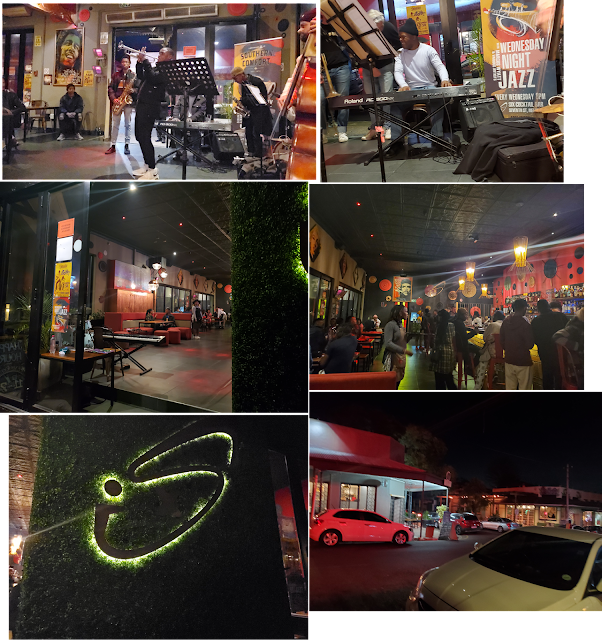 |
| Jazz Jam Session at Six Cocktails Bar, Melville Johannesburg |
 |
| Maya Cunningham with South African jazz expert Simon Ndlovu |
 |
| Maya Cunningham with Sydney Mavundla, one of the great jazz trumpet players of South Africa |
 |
| Sydney Mavundla in Concert at the Market Theatre, Johannesburg |
 |
| Scenes from Niki's Jazz Club, Johannesburg |
It was a fun evening that ended at Niki’s Jazz Club. A jazz club owned by a Black woman named Niki – which is another rarity in the US. (FYI – most jazz clubs in the US are owned by Euro-Americans). It was at Niki’s that I had my first traditional South African cuisine. Beef stew with greens and steamed bread. Soul food from any Black culture just hits one's body in a particular way with no comparison.
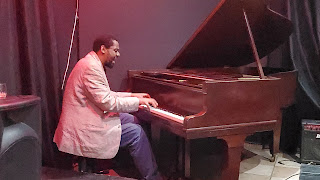 |
| Jazz Pianist Africa Mkhize |
Especially if you are hungry. I am not exaggerating when I say that this meal was one of the best I have ever had. Bra Sydney and his pianist for the evening, the great Africa Mkhize, came into the club for the traditional post-show hanging out. Bra Africa is something else. That’s all I can say. In DC, men like him are said to be ‘wild boys.’ The expression goes like this. Someone mentions a name. The respondent gives a knowing look, flashes something between a smirk and a smile, maybe
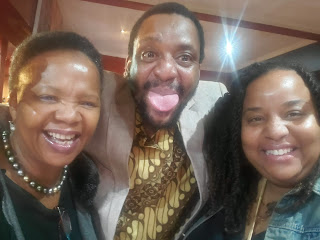 |
| Maya Cunningham with Bra Africa Mkhize and Niki Sondlo, who owns Niki's Jazz Club |
shakes his head and then says, “Yeah, so and so (the person's name), now that’s a wiiild boy!” The person who he is talking to knows exactly the behavior the other is referring to, but it goes unsaid, encapsulated in that one moniker. I have heard that saying plenty of times, and always of a man who is a bit high-strung, who might have a little mean streak, who is sometimes temperamental, is always lively and who speaks with no filter, often saying surprising and out-of-pocket things that break social norms. ‘Wild boys’ might have a tendency to become a little tipsy as an evening progresses, and are often known to be bombastic. Of course there are different varieties, but I can always spot them out. Bra Africa is definitely one. It was a fun time.
On Saturday I was out for the whole day. I had a nice
manicure and pedicure (which is extremely inexpensive here). Just this simple
everyday activity helped me to know how deeply the US is a raced-state. Have
you noticed that different racial or ethnic groups do specific kinds of work?
My manicurist was from Zimbabwe. In the US most of the nail salons are owned and operated by
Asian folks. My manicurist back in Massachusetts is from Vietnam, as is every
other technician at that salon. It started with African slavery. One group
assigned to a specific kind of labor. One group assuming the position of the
ruling class. Raced labor roles contribute to stereotypes and the assumption
that someone from a particular group cannot do work that the group does not
often do. What an unhealthy society. Here in South Africa, Black folks do all
jobs. And they rule the country. Hurray! So anyway, all beauty needs will be covered for my remaining time here by 1 Classie Africa Beauty Salon and
Spa.
After the salon, I took an uber to a restaurant called Pata
Pata that I went to my first night in Joburg back in 2017. It is in an area
called Maboneng, and I was in for a surprise. Maboneng is the most vibrant
Black arts area that I have ever seen. Murals were everywhere. As I got out of
the taxi there were rows of artistic boutiques, shops, restaurants, and coffee
bars. All Black-owned. In fact, I have not been to a non-Black-owned business
since I got here 8 days ago (more on this later).
People were everywhere, snapping photos and having fun, and I took it all in. Music was pouring into the streets. I heard Bob Marley and renditions of songs by Fela Kuti. It was a Black arts street festival, but it happens every Saturday and Sunday. I had not experienced a scene like this. The Brooklyn Caribbean Day festival and Adams Morgan Day do not compare. I visited each shop…as many as I could. I found a shop called Tachena Africa. The owner, Lincoln Kamuchanyu, is from Zimbabwe, and he makes everything in the shop. What creativity! And what space for creativity! Does anything like this exist for and by Black people in the US (that is not under threat of gentrification?) I haven’t been everywhere, but I don’t think so.
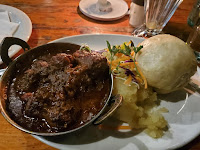 After just a little shopping, and a lot of exploring, I had
a dinner of oxtails and steamed bread from Pata
After just a little shopping, and a lot of exploring, I had
a dinner of oxtails and steamed bread from Pata Pata. Well. South African cuisine is my new favorite. And I thought I could never love a cuisine as much as I love Senegalese food. This is soul food for real. After dinner I made my way to a restaurant called eDikini, in a very exclusive area of Joburg called Sandton. It used to be white only during apartheid. Not anymore. eDikini is a beautiful upscale restaurant. A brother and alto sax player named Nhlanhla Mahlangu was performing there with jazz vocalist Josie Matabola. My brother-friend Siphiwe Shiburi was in drums. After two incredible sets of music, I exchanged introductions and greetings with Nhlanhla and Siphewe and took an Uber home. It was a whirlwind first week and an excellent start to my research project.
Now it’s time for my reflections. As I sat in eDikini, that beautiful upscale restaurant that is owned by a Black man, I gazed at the elite Black patrons who enjoyed gourmet food, wine, the atmosphere, and
each other. They had freedom. At a similar restaurant in the US, in that kind of exclusive area, it would not have been Black-owned. It is as simple as that and a hard truth. White patrons and servers would have looked at me and treated me as if I didn’t belong. They would have reacted to me as if I was out of my colonial place. I kept looking at the small group in a glassed - in exclusive room in the upper level. This is part of what the anti-apartheid Freedom Struggle generation sacrificed for. Winnie Mandela said that she and her comrades gave themselves completely to the movement, and ‘sacrificed self,’ as she put it. They did not pursue their individual careers. They risked all to give all of their energy to the struggle. As I sat in that restaurant I understood why. They took back the country for their children to enjoy. Those folks had good careers that paid well, and were fully enjoying the prosperity of the country. A prosperity that their forefathers paid a high price for toiling in the gold and diamond mines that made the country rich. A prosperity for which many people were arrested, tortured and killed because they were protesting the apartheid regime that made them non-citizens in their own country, and denied them the right to vote. I wonder if African America has progressed in the same way. How many Black folks own businesses, have a good education and are enjoying well paid careers? Can African Americans go to any area of the cities they live in without being seen as stepping out of their place? The answer is no. My brothers and sisters, we need to make a plan to finish achieving our freedom.Freedom. Perhaps the answer lies in the example of Maboneng. Do you all remember how Fort Greene Brooklyn, back in the 1980s and 1990s was a flourishing, eclectic Black arts scene. Affordable real estate, in close proximity to the New York City, allowed many Black painters, jazz musicians, dancers and other artists to make a wonderful arts community. Betty Carter lived in Fort Greene. Musicians like Steve Coleman and Cassandra Wilson came out of that scene. Hallmark Afrocentric fashion landmarks like Moshood defined the area. It has all been completely gentrified. It’s gone. Adams Morgan in the 1980s into the early 2000s was an exciting cultural hub in Washington DC, with arts and music from cultures around the world. It’s gone now. Completely gentrified. U Street in DC was a Black arts scene in the late 1990s and early 2000s, especially for DC’s Black poetry movement and jazz. I used to sing at a club there called Café Nema. It is now completely gentrified with an unrecognizable landscape and the commemorative mural of Duke Ellington was unapologetically removed by the new occupiers a few years back. Young professional whites who have taken over the area. And let’s not fool ourselves. This is about numbers. An African American minority and a huge white majority that has economically benefited from the ‘white flight’ departure from urban centers in the 1960s, redlining and de facto racial segregation in their well-funded suburban school districts. But guess what – African Americans have land and an open invitation here in Africa. We don’t have to tolerate things like gentrification and the loss of our cultural arts districts any longer. Let’s figure out a way to come here.
Being here in Africa has given me perspective about the
toxic racist poison of the United States. Perspective that I did now know that
I was missing. It feels good to be away from the governance of those who harbor
racial hatred and who define themselves by such. And I am learning things that
are only possible in an industrialized nation-state in Africa, and in its largest
urban center. I have seen the demise of Black arts scenes, and Black jazz
outlets, because of ongoing and seemingly inescapable de facto apartheid in the
US, and I have been waiting for both of these to blossom…somewhere. Both are here, down-under, in Johannesburg.

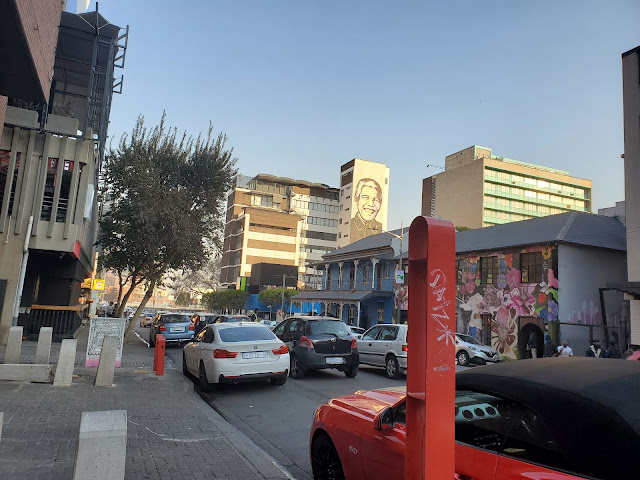


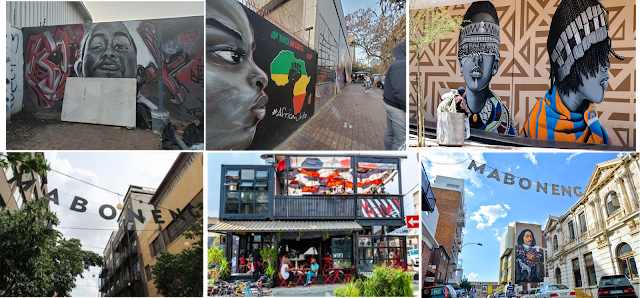


wonderful your writings are beautiful and bring to life even though I am not there music everyone I can truly learned from my brothers and sister and the arts are simply breathtaking for on king street in spfld I viewed a artist paintinh in our community a bunch of mouses and elephants on the laundy mat building what a mess we need on that wall black culture as I seen in your writings keep up the excellent work thanks for sharing
ReplyDeleteThank you and thank you for reading!
Delete